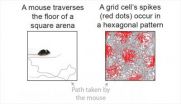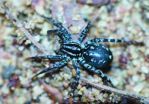(Press-News.org) Athens, Ga. – University of Georgia researchers discovered important genetic clues about the history of microorganisms called archaea and the origins of life itself in the first ever study of its kind. Results of their study shed light on one of Earth's oldest life forms.
"Archaea are an ancient form of microorganisms, so everything we can learn about them could help us to answer questions about the origin of life," said William Whitman, a microbiology professor in the Franklin College of Arts and Sciences and co-author on the paper.
Felipe Sarmiento, lead author and doctoral student in the microbiology department, surveyed 1,779 genes found in the genome of Methanococcus maripaludis, aquatic archaea commonly found in sea marshes, to determine if they were essential or not and learn more about their functions. He found that roughly 30 percent, or 526 genes, were essential. We now know which genes are driving the most important functions of the cell. The results of the study were published March 4 in the PNAS Early Edition and were performed with Jan Mrázek, an associate professor in the department of microbiology and the UGA Institute of Bioinformatics.
Although archaea are relatively simple organisms, the genetic systems they use to build cellular life are similar to those of more complicated eukaryotic cells found in complex organisms including animals and plants. For this reason, many scientists believe that eukaryotes evolved from ancient archaea.
These genetic systems are what allow information coded on DNA to build life.
"DNA by itself is a rock," Whitman said. "You need all these other systems to make the DNA become a living cell."
Because DNA is so fundamental to the modern cell, DNA synthesis has long been thought to be one of the most conserved processes in living organisms.
"It was a surprise when this study found that the system for making DNA was unique to the archaea," Whitman said. "Learning that it can change in the archaea suggest that ability to make DNA formed late in the evolution of life. Possibly, there may be unrecognized differences in DNA biosynthesis the eukaryotes or bacteria as well."
Other essential genes in these archaea are necessary for methane production. Methanogensis, or the process of making methane gas, is how these microorganisms make energy for life.
"Humans burn glucose and reduce oxygen to water, these guys burn hydrogen gas and reduce CO2 to methane," Whitman explained.
Methanogenesis requires six vitamins not commonly found in other organisms. Understanding how these vitamins are made and how they are involved in the process of changing carbon dioxide to methane sheds light on developing new and better processes for methane production for fuel.
"This was a general investigation, but there are many questions it can answer, like possibly making methane better or more efficiently," Whitman said.
The study yielded many other important results.
"We found 121 proteins that are essential for this organism that we know nothing about," Sarmiento said. "This finding asks questions about their functions and the specific roles that they are playing."
"We are starting to get some insights about how this organism was actually formed," Sarmiento said. "There is a lot of information and it is interesting because it gives insights into a complete domain of life."
###
Writer: April Reese Sorrow, 706/542-7991, aprilr@uga.edu
Contact: William Whitman, 706/542-4219, Whitman@uga.edu; Felipe Sarmiento, 706/542-4692, felipes@uga.edu
UGA researchers shed light on ancient origin of life
2013-03-07
ELSE PRESS RELEASES FROM THIS DATE:
Researchers discover workings of brain's 'GPS system'
2013-03-07
Just as a global positioning system (GPS) helps find your location, the brain has an internal system for helping determine the body's location as it moves through its surroundings.
A new study from researchers at Princeton University provides evidence for how the brain performs this feat. The study, published in the journal Nature, indicates that certain position-tracking neurons — called grid cells — ramp their activity up and down by working together in a collective way to determine location, rather than each cell acting on its own as was ...
Governors of Ancient Egypt suffered from malnutrition dying before they were 30 years old
2013-03-07
The ancient Egyptians did not live in such good conditions and were not surrounded by such opulence as was thought up to now, but, rather, suffered from hunger and malnutrition, a whole range of infectious diseases and an extremely high infant mortality rate. Furthermore, the governors of Aswan, on the border with Sudan, as well as their families, interbred with the black peoples of the neighbouring country.
These are some of the conclusions drawn from the Qubbet el-Hawa research project, carried out by the University of Jaen, in which anthropologists from the University ...
Killing cancer cells with acid reflux
2013-03-07
A University of Central Florida chemist has come up with a unique way to kill certain cancer cells – give them acid reflux.
Chemistry professor Kevin Belfield used a special salt to make cancer cells more acidic – similar to the way greasy foods cause acid reflux in some people. He used a light-activated, acid-generating molecule to make the cells more acidic when exposed to specific wavelengths of light, which in turn kills the bad cells. The surrounding healthy cells stay intact.
The technique is a simple way around a problem that has frustrated researchers for years. ...
Pancakes with a side of math
2013-03-07
Philadelphia, PA—For many of us, maple syrup is an essential part of breakfast—a staple accompaniment to pancakes and waffles—but rarely do we think about the complicated and little-understood physiological aspects of syrup production. Each spring, maple growers in temperate regions around the world collect sap from sugar maple trees, which is one of the first steps in producing this delicious condiment.
However, the mechanisms behind sap exudation—processes that trigger pressure differences causing sap to flow— in maple trees are a topic of much debate. In a paper ...
HIV therapy just got easier: Fewer drugs may be needed for treatment-experienced patients
2013-03-07
VIDEO:
Karen Tashima, MD, director of the HIV Clinical Trials Program at The Miriam Hospital, led a study to look at new treatment regimens for patients with drug-resistant HIV.
...
Click here for more information.
PROVIDENCE, R.I. – A new multi-site study reveals patients with drug-resistant HIV can safely achieve viral suppression – the primary goal of HIV therapy – without incorporating the traditional class of HIV medications into their treatment regimen. Karen Tashima, M.D., ...
Majority of Albertans support assisted suicide: UAlberta study
2013-03-07
(Edmonton) An overwhelming majority of Albertans believe dying adults should have the right to request to end their life, according to new research from the University of Alberta.
U of A researcher Donna Wilson led the team that studied the views of 1,203 Albertans on assisted suicide, currently illegal in Canada. A majority—77.4 per cent—felt dying adults should have the right to end their life early.
"Increasingly, there are countries or states where they are allowing assisted suicide or euthanasia. Like many of those countries, Canada will have to grapple with this ...
UTHealth researchers find industrial chemicals in food samples
2013-03-07
HOUSTON – (March 6, 2013) – Researchers at The University of Texas Health Science Center at Houston (UTHealth) have discovered phthalates, industrial chemicals, in common foods purchased in the United States. Phthalates can be found in a variety of products and food packaging material, child-care articles and medical devices.
"Although it's not completely understood how phthalates get into our food, packaging may be a contributor to the levels of the toxin in food," said lead investigator Arnold Schecter, M.D., M.P.H., professor of environmental health at The University ...
A new cryptic spider species from Africa
2013-03-07
The species from the genus Copa are very common spiders found in the leaf litter of various habitats. Being predominantly ground-living, they occur widely in savanna woodlands but also occasionally in forests, where they are well camouflaged. They usually share the litter microhabitats with several other species of the family Corinnidae. The spiders from this cryptic, ground-dwelling genus in the continental Afrotropical Region are revised in a study published in the open access journal Zookeys.
The number of continental species in the Afrotropical Region has been reduced ...
How to predict the progress of technology
2013-03-07
CAMBRIDGE, MA -- Researchers at MIT and the Santa Fe Institute have found that some widely used formulas for predicting how rapidly technology will advance — notably, Moore's Law and Wright's Law — offer superior approximations of the pace of technological progress. The new research is the first to directly compare the different approaches in a quantitative way, using an extensive database of past performance from many different industries.
Some of the results were surprising, says Jessika Trancik, an assistant professor of engineering systems at MIT. The findings could ...
Iowa State engineers developing ideas, technologies to save the Earth from asteroids
2013-03-07
AMES, Iowa – Bong Wie has heard the snickers.
You want to protect the Earth from asteroids? Where were you when the dinosaurs needed you? You want to be like Bruce Willis in that asteroid movie?
Wie has a serious reply: After five years of science and engineering work, Wie and his small team have a publication list of 40-plus technical papers, $600,000 of NASA research support and a proposal for a $500 million test launch of an asteroid intercept system. Plus, Wie has just been invited to show off his research as part of NASA's Technology Day on the Hill in Washington, ...




